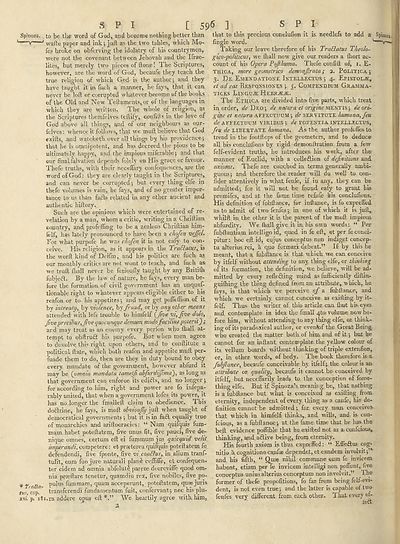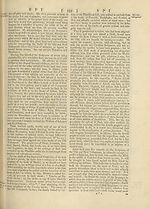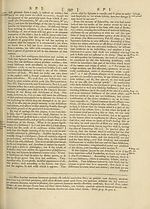Encyclopaedia Britannica, or, a Dictionary of arts, sciences, and miscellaneous literature : enlarged and improved. Illustrated with nearly six hundred engravings > Volume 19, Scripture-SUG
(646) Page 596
Download files
Complete book:
Individual page:
Thumbnail gallery: Grid view | List view

S P I [ 596 ] s P I
Spinoza. . to be the word of God, and become nothing better than
■’— ' wafte paper and ink*, juft as the two tables, which Mo-
fes broke on obferving the idolatry of his countrymen,
were not the covenant between Jehovah and the Ifrae-
lites, but merely two pieces of ftone! The Scriptures,
however, are the word of God, becaufe they teach the
true religion of which God is the author*, and they
have taught it in fuch a manner, he fays, that it can
never be loft or corrupted whatever become of the books
of the Old and New Teftaments,or of the languages in
which they are written. The whole of religion, as
the Scriptures themfelves teftify, confills in the love of
God above all things, and ot our neighbours as our-
felves: whence it follows, that we muft believe that God
exifts, and watcheth over all things by his providencej
that he is omnipotent, and has decreed the pious to be
ultimately happy, and the impious miferable5 and that
cur final ialvation depends folely on His grace or favour.
Thefe truths, with their neceffary confequences, are the
word of God: they are clearly taught in the Scriptures,
and can never be corrupted; but every thing elfe in
thefe volumes is vain, he fays, and of no greater impor¬
tance to us than facts related in any other ancient and
authentic hiftory.
Such are the opinions which were entertained of re¬
velation by a man, whom a critic, writing in a Chriftian
country, and, profefling to be a zealous Chriftian him-
felf, has lately pronounced to have been a chofen veJfeL
For what purpofe he was chofen it is not eafy to con¬
ceive. His religion, as it appears in the TraRatus, is
the worft kind of Deifm, and his politics are fucb as
our monthly critics are not wont to teach, and fuch as.
we truft ftvall never be ferioufly taught by any Britifh
fubjeft. By the law of nature, he fays, every man be¬
fore the formation of civil government has an unquef-
tionable right to whatever appears eligible either to his
reafon or to his appetites j and may get poffeflion of it
by intreaty, by violence, by fraud, or by any other means
attended with lefs trouble to bimfelf {five vi,five dalo,
fiveprecibus,five quocunque demum modo faciliiupotent) ;
and may treat as an enemy every perfon who ftlall at¬
tempt to obftruft his purpofe. But when men agree
to devolve this right upon others, and to conftitute a
political ftate, which both reafon and appetite muft per-
fuade them to do, then are they in duty bound to obey
every mandate of the government, however abfurd it
may be {omnia mandata tametji abfurdiffima'), as long as
that government can enforce its edidiis, and no longer j
for according to him, right and power are fo infepa-
vably united, that when a government lofes its power, it
has no longer the fmalleft claim to obedience. 'I his
do&rine, he fays, is moft obvioufy juft when taught of
democratical governments; but it is in faff equally true
of monarchies and ariftocracies: “ Nam quifquis fum-
mam habet poteftatem, five unus fit, five pauci, five de-
nique omnes, certum eft ei fummum jus quicquid velit
imperandi, competere: et preoterea quifquis poteftatem fe
defendendi, five fponte, five vi coaRus, in alium tranf-
tulit, eum fuo jure naturali plane cefliffe, et confequen-
ter eidem ad omnia abfolute parere decreviffe quod om¬
nia proeftare tenetur, quamdiu rex, five nobiles, five po-
*TraBa pulus fummara, quam acceperunt, poteftatem, quae juris
tvs, cap. transferendi fundamentum fuit, confervant*, nec his plu-
xvlp. iSi.ra addere opus eft*.” We heartily agree with him,
a
that to this precious coneiufion it is needlefs to add a Spinczl J
{ingle word.
Taking our leave therefore of his TraRatus Theolo-
gico-politicus, we {hall now give our readers a ftiort ac¬
count of his Opera Pqflhuma. Thefe confift of, 1. E-
THICA, more geometrico demonfrata; 2. Politica 5
3. D& Emendatione Inteleectus *, 4. Epistoue,
et ad eas Respqnsiones j 5. Compendium Gramma-
TICES LlNGUJE HEERiEiE.
The Ethica are divided into five parts, which treat
in order, de Deo j de natura et origine mentis 5 de ori¬
gin e et natura affectuum 5 de servitute humana,feu
de AFFECTUUM V1RIBUS *, de POTENT IA INTEELECTUS,
feu de libertate humana. As the author profcffcs to
tread in the foottleps of the geometers, and to deduce
all his conclufions by rigid demonftration from a few
felf-evident truths, he introduces, his work, after the
manner of Euclid, with a colleftion of definitions and
axioms. Thefe are couched in terms generally ambi¬
guous j and therefore the reader will do well to con-
fider attentively in what fenfe, if in any, they can be
admitted; for it will not be found eafy to grant his
premifes, and at the fame time refufe his conclufions.
His definition of fubftance, for inftanee, is fo expreffed
as to admit of two fenfes; in one of which it is juft,
whilft in the other it is the parent of the moft impious
abfurdity. We (hall give it in hb own words: “ Per
fubftantiam intelligoid, quod in fe eft, et per fecor.ei-
pitur: hoc eft id, cujus conceptus non indiget concep-
tu alterius rei, a quo formart d.ebeat.” If by this be
meant, that a fubftance is that which eve can conceive
by itfelf without attending to any thing elfe, or thinking
of its formation, the definition, we believe, will be ad¬
mitted by every refle£ling mind as fufticiently diftim-
guifhing the thing defined from an attribute, which, he
fays, is that which we perceive of a fubllance, and
which we certainly cannot conceive as exifting by it¬
felf. Thus the writer of this article can fliut his eyes
and contemplate in idea the fmall 4to volume now be¬
fore him, without attending to any thing elfe, or think¬
ing of its paradoxical author, or evenfef the Great Being
who created the matter both of him and of it; but he
cannot for an inftant contemplate the yellow* colour of
its vellum boards without thinking of. triple extenfion,
or, in other words, of body. The book therefore is a.
fiubfiance, becaufe conceivable by itfelf; the colour is an
attribute or quality, becaufe it cannot be conceived by
itfelf, but neeeflarily leads to the conception of fome-
thing elfe. But if Spinoza’s meaning be, that nothing
is a fubftance but what is conceived as exifting from
eternity, independent of every thing as a caufe, his de¬
finition cannot be admitted ; for. every man conceives
that which in himfelf thinks,, and wills, and is con-
feious, as a fubftanee; at the fame time that he has the
beft evidence poflible that he exifted not as a confeious,
thinking, and aftiye being, from eternity.
His fourth axiom is thus expreffed: “ Effe&us cog-
nitio h. cognition© caufse dependet, et eandem involvit;”'
and his fifth, “ Quse nihil commune cum fe invicem
habent, etiam per fe invicem ititelligi non poffunt, five
conceptus unius alterius conceptum non involvit.” I he
former of thefe propofitions, fo far from being felf-evi¬
dent, is not even true; and the latter is capable of two
fenfes very different from each other. T hat every of-
Spinoza. . to be the word of God, and become nothing better than
■’— ' wafte paper and ink*, juft as the two tables, which Mo-
fes broke on obferving the idolatry of his countrymen,
were not the covenant between Jehovah and the Ifrae-
lites, but merely two pieces of ftone! The Scriptures,
however, are the word of God, becaufe they teach the
true religion of which God is the author*, and they
have taught it in fuch a manner, he fays, that it can
never be loft or corrupted whatever become of the books
of the Old and New Teftaments,or of the languages in
which they are written. The whole of religion, as
the Scriptures themfelves teftify, confills in the love of
God above all things, and ot our neighbours as our-
felves: whence it follows, that we muft believe that God
exifts, and watcheth over all things by his providencej
that he is omnipotent, and has decreed the pious to be
ultimately happy, and the impious miferable5 and that
cur final ialvation depends folely on His grace or favour.
Thefe truths, with their neceffary confequences, are the
word of God: they are clearly taught in the Scriptures,
and can never be corrupted; but every thing elfe in
thefe volumes is vain, he fays, and of no greater impor¬
tance to us than facts related in any other ancient and
authentic hiftory.
Such are the opinions which were entertained of re¬
velation by a man, whom a critic, writing in a Chriftian
country, and, profefling to be a zealous Chriftian him-
felf, has lately pronounced to have been a chofen veJfeL
For what purpofe he was chofen it is not eafy to con¬
ceive. His religion, as it appears in the TraRatus, is
the worft kind of Deifm, and his politics are fucb as
our monthly critics are not wont to teach, and fuch as.
we truft ftvall never be ferioufly taught by any Britifh
fubjeft. By the law of nature, he fays, every man be¬
fore the formation of civil government has an unquef-
tionable right to whatever appears eligible either to his
reafon or to his appetites j and may get poffeflion of it
by intreaty, by violence, by fraud, or by any other means
attended with lefs trouble to bimfelf {five vi,five dalo,
fiveprecibus,five quocunque demum modo faciliiupotent) ;
and may treat as an enemy every perfon who ftlall at¬
tempt to obftruft his purpofe. But when men agree
to devolve this right upon others, and to conftitute a
political ftate, which both reafon and appetite muft per-
fuade them to do, then are they in duty bound to obey
every mandate of the government, however abfurd it
may be {omnia mandata tametji abfurdiffima'), as long as
that government can enforce its edidiis, and no longer j
for according to him, right and power are fo infepa-
vably united, that when a government lofes its power, it
has no longer the fmalleft claim to obedience. 'I his
do&rine, he fays, is moft obvioufy juft when taught of
democratical governments; but it is in faff equally true
of monarchies and ariftocracies: “ Nam quifquis fum-
mam habet poteftatem, five unus fit, five pauci, five de-
nique omnes, certum eft ei fummum jus quicquid velit
imperandi, competere: et preoterea quifquis poteftatem fe
defendendi, five fponte, five vi coaRus, in alium tranf-
tulit, eum fuo jure naturali plane cefliffe, et confequen-
ter eidem ad omnia abfolute parere decreviffe quod om¬
nia proeftare tenetur, quamdiu rex, five nobiles, five po-
*TraBa pulus fummara, quam acceperunt, poteftatem, quae juris
tvs, cap. transferendi fundamentum fuit, confervant*, nec his plu-
xvlp. iSi.ra addere opus eft*.” We heartily agree with him,
a
that to this precious coneiufion it is needlefs to add a Spinczl J
{ingle word.
Taking our leave therefore of his TraRatus Theolo-
gico-politicus, we {hall now give our readers a ftiort ac¬
count of his Opera Pqflhuma. Thefe confift of, 1. E-
THICA, more geometrico demonfrata; 2. Politica 5
3. D& Emendatione Inteleectus *, 4. Epistoue,
et ad eas Respqnsiones j 5. Compendium Gramma-
TICES LlNGUJE HEERiEiE.
The Ethica are divided into five parts, which treat
in order, de Deo j de natura et origine mentis 5 de ori¬
gin e et natura affectuum 5 de servitute humana,feu
de AFFECTUUM V1RIBUS *, de POTENT IA INTEELECTUS,
feu de libertate humana. As the author profcffcs to
tread in the foottleps of the geometers, and to deduce
all his conclufions by rigid demonftration from a few
felf-evident truths, he introduces, his work, after the
manner of Euclid, with a colleftion of definitions and
axioms. Thefe are couched in terms generally ambi¬
guous j and therefore the reader will do well to con-
fider attentively in what fenfe, if in any, they can be
admitted; for it will not be found eafy to grant his
premifes, and at the fame time refufe his conclufions.
His definition of fubftance, for inftanee, is fo expreffed
as to admit of two fenfes; in one of which it is juft,
whilft in the other it is the parent of the moft impious
abfurdity. We (hall give it in hb own words: “ Per
fubftantiam intelligoid, quod in fe eft, et per fecor.ei-
pitur: hoc eft id, cujus conceptus non indiget concep-
tu alterius rei, a quo formart d.ebeat.” If by this be
meant, that a fubftance is that which eve can conceive
by itfelf without attending to any thing elfe, or thinking
of its formation, the definition, we believe, will be ad¬
mitted by every refle£ling mind as fufticiently diftim-
guifhing the thing defined from an attribute, which, he
fays, is that which we perceive of a fubllance, and
which we certainly cannot conceive as exifting by it¬
felf. Thus the writer of this article can fliut his eyes
and contemplate in idea the fmall 4to volume now be¬
fore him, without attending to any thing elfe, or think¬
ing of its paradoxical author, or evenfef the Great Being
who created the matter both of him and of it; but he
cannot for an inftant contemplate the yellow* colour of
its vellum boards without thinking of. triple extenfion,
or, in other words, of body. The book therefore is a.
fiubfiance, becaufe conceivable by itfelf; the colour is an
attribute or quality, becaufe it cannot be conceived by
itfelf, but neeeflarily leads to the conception of fome-
thing elfe. But if Spinoza’s meaning be, that nothing
is a fubftance but what is conceived as exifting from
eternity, independent of every thing as a caufe, his de¬
finition cannot be admitted ; for. every man conceives
that which in himfelf thinks,, and wills, and is con-
feious, as a fubftanee; at the fame time that he has the
beft evidence poflible that he exifted not as a confeious,
thinking, and aftiye being, from eternity.
His fourth axiom is thus expreffed: “ Effe&us cog-
nitio h. cognition© caufse dependet, et eandem involvit;”'
and his fifth, “ Quse nihil commune cum fe invicem
habent, etiam per fe invicem ititelligi non poffunt, five
conceptus unius alterius conceptum non involvit.” I he
former of thefe propofitions, fo far from being felf-evi¬
dent, is not even true; and the latter is capable of two
fenfes very different from each other. T hat every of-
Set display mode to:
![]() Universal Viewer |
Universal Viewer | ![]() Mirador |
Large image | Transcription
Mirador |
Large image | Transcription
Images and transcriptions on this page, including medium image downloads, may be used under the Creative Commons Attribution 4.0 International Licence unless otherwise stated. ![]()
| Permanent URL | https://digital.nls.uk/192703680 |
|---|
| Attribution and copyright: |
|
|---|
| Description | Ten editions of 'Encyclopaedia Britannica', issued from 1768-1903, in 231 volumes. Originally issued in 100 weekly parts (3 volumes) between 1768 and 1771 by publishers: Colin Macfarquhar and Andrew Bell (Edinburgh); editor: William Smellie: engraver: Andrew Bell. Expanded editions in the 19th century featured more volumes and contributions from leading experts in their fields. Managed and published in Edinburgh up to the 9th edition (25 volumes, from 1875-1889); the 10th edition (1902-1903) re-issued the 9th edition, with 11 supplementary volumes. |
|---|---|
| Additional NLS resources: |
|

